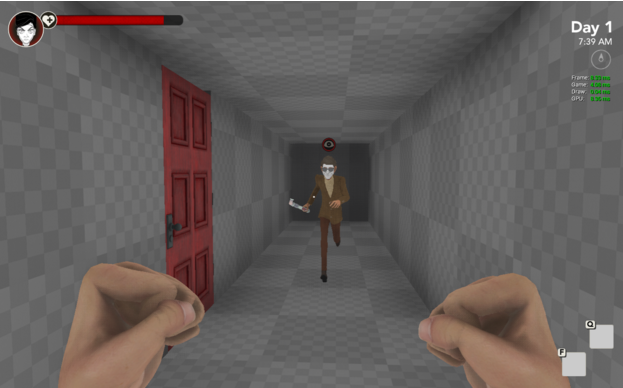The craft of writing
for games, TV and movies,
by a working writer
for games, TV and movies,
by a working writer
Complications Ensue:
The Crafty Screenwriting, TV and Game Writing Blog
The Crafty Screenwriting, TV and Game Writing Blog
... with forays into
games, life and
political theatre.
games, life and
political theatre.
Sunday, December 20, 2015
Liz England explains Game Development in terms of doors. A sample:
Premise: You are making a game.
- Are there doors in your game?
- Can the player open them?
- Can the player open every door in the game?
- Or are some doors for decoration?
- How does the player know the difference?
- Are doors you can open green and ones you can’t red? Is there trash piled up in front of doors you can’t use? Did you just remove the doorknobs and call it a day? [snip]
And then who does what:
- Creative Director: “Yes, we definitely need doors in this game.”
- Project Manager: “I’ll put time on the schedule for people to make doors.”
- Designer: “I wrote a doc explaining what we need doors to do.”
- Concept Artist: “I made some gorgeous paintings of doors.”
- Art Director: “This third painting is exactly the style of doors we need.”
- Environment Artist: “I took this painting of a door and made it into an object in the game.”
- Animator: “I made the door open and close.” [snip]
The full post goes on at much greater length; check it out.
"Door" is not a metaphor. We spent a bit of time earlier this year talking about how the player would know which doors open, which are locked, which are locked and only unlockable with a special item, and which are purely decorative.
Oh, and Studio Cypher made the first part into a poster:
Labels: making games, videogames
1 comments
Friday, December 18, 2015
This week I’ve been continuing to work on our gigantic Encounters spreadsheet. Level designers contribute the situation and objective: do this, get that. I try to figure out who the characters in the encounters are, and why they want those things, essentially retro-engineering from the gameplay. I then write dialog, if needed, as well as tooltips, journal entries, and lore. I’m most of the way through fleshing out the encounters for the first Garden District island. So GD1 is now, at least in our design, populated with all sorts of strange characters that the player can interact with in ways more challenging than clonking them on the head and taking their stuff.
We’re also working on the very early parts of the game, where we’ll spawn encounters that help define the world, and incidentally show new players how to do basic things, like clonk characters on the head and take their stuff.
In my copious free time, I’m also writing a later player character’s version of every single thing Arthur says. This character has a very different point of view on her interactions, and I don’t think she’s as inclined to apologize for, say, clonking people on the head, or taking their stuff.
Find the rest of the team's update here.Labels: We Happy Few
0 comments
Wednesday, December 16, 2015
Q. I am filing a lawsuit against a movie studio who I believe stole my pilot for their movie [...]. I have a copyright from 2010, and the movie was released in 2012.Would you know of any good entertainment lawyers...?
A couple of things to consider: If their movie was released in 2012, it was presumably shot in 2011, which means there would have likely been a script in 2009-2010. Most projects go through several rounds of rewrites; development typically goes on for years.
There are many many scripts with similar elements. Many writers have similar ideas. Some ideas are just in the air. Some follow from the subject material. Can you prove that any specific person at the studio read your script? For example, Art Buchwald was able to sue Paramount over Coming to America because they’d signed a contract with him to work on the project.
If you did submit a script to a studio, they almost certain had you sign a release form. Release forms are not 100% effective (they are arguably unconscionable), but they are written specifically to insulate companies from "you stole my idea" suits.
Actually, you can legally steal any idea. Ideas are not copyrightable. You can only copyright the expression of an idea: plot, characterization, dialog, unique action sequences. You would have to prove that their movie has so many specific similarities to your script that they surely must have used your script.
Bear in mind: movie studios have lots of very fancy lawyers on retainer, who do nothing all day but fend off lawsuits. Unless you can invest $100,000 in your lawsuit, you’ll probably get swamped by their legal team no matter what the merits of the case are.
(I am not a lawyer; this is not legal advice.)Labels: copyright
0 comments
Friday, December 11, 2015
We’re making a big push to populate our procedural world with encounters, so I’m shifting my efforts from recording barks and cutscenes to fleshing out encounters. David has written a huge gigantic spreadsheet detailing all sorts of shenanigans you can get into on our various islands. My job is to take his gameplay specifications and make them into encounters that feel meaningful in addition to being fun challenges. Writing dialog is easy (well, I’ve been doing it for 25 years); the hard part is figuring out who the NPC we’re meeting is, what his unique agenda is, and making sure that is revelatory of our world, our lore and our theme.
Labels: We Happy Few
0 comments
Morgan le Fay--
King Arthur's lover and nemesis
--was a teenage girl once...
This work is licensed under a
Creative Commons License.



